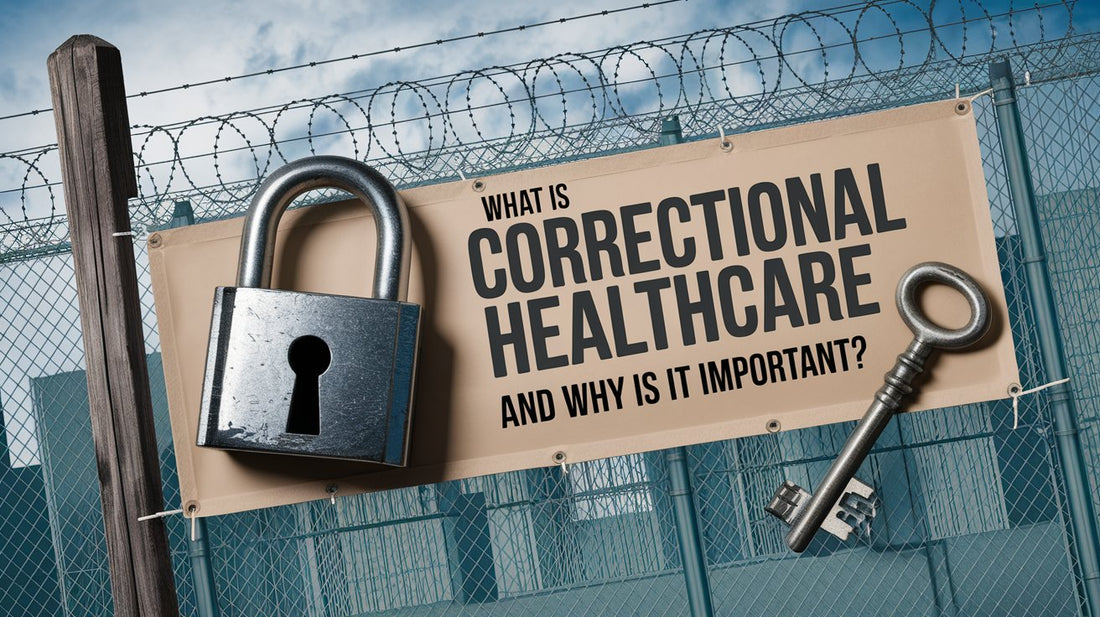
What is Correctional Healthcare and Why Is It Important?
Share
Correctional healthcare is a specialized field that provides medical, mental, and behavioral care to individuals incarcerated in prisons, jails, and detention centers. Often overlooked, it is a critical component of the correctional system, ensuring that incarcerated individuals receive the healthcare services necessary to maintain public health, human rights, and social stability.
The importance of correctional healthcare extends beyond prison walls. Correctional facilities house individuals with some of the most complex health needs, often resulting from a lack of access to care prior to incarceration. Many inmates enter the system with untreated chronic conditions such as hypertension, diabetes, and infectious diseases like hepatitis C or HIV. Additionally, mental health disorders and substance abuse are prevalent, with conditions like depression, schizophrenia, and post-traumatic stress disorder (PTSD) being highly linked to criminal behavior. Addressing these issues within correctional settings is essential for reducing recidivism and improving the overall health of the community when these individuals are released.
The Role of Correctional Health Practitioners
The primary goal of a correctional health practitioner is to provide comprehensive, evidence-based care tailored to the unique needs of incarcerated individuals. Unlike traditional healthcare settings, correctional healthcare requires practitioners to balance medical ethics with security concerns. Correctional nurses, for instance, must adapt to working in a highly regulated environment where patient autonomy is limited, and safety protocols dictate much of the care delivery process. Despite these challenges, the role is deeply rewarding for those committed to providing equitable healthcare to marginalized populations.
For healthcare professionals considering a transition into correctional healthcare,the work can be both challenging and fulfilling. It offers the opportunity to make a tangible difference in the lives of individuals who are often underserved by the healthcare system. If you're exploring new career opportunities or seeking professional growth in healthcare, Energized Vision offers tailored coaching to help you navigate this transition. Schedule a free discovery call to learn more.
Health Challenges and Solutions in Correctional Settings
One of the most pressing issues in correctional healthcare is the high prevalence of chronic and infectious diseases. Five common health problems found in prisons include:
- Substance Use Disorders
- Mental Health Conditions
- Chronic Diseases (e.g., hypertension, diabetes)
- Infectious Diseases (e.g., tuberculosis, hepatitis C)
- Dental Health Issues
Correctional facilities must also address the needs of aging inmates, a population that is steadily increasing due to longer sentences and mandatory minimums. Older inmates often face unique challenges, such as dementia, limited mobility, and higher rates of chronic disease. Ensuring effective treatment and compassionate care for elderly prisoners is a growing priority in correctional healthcare. In cases where inmates develop dementia, facilities may need to implement specialized care plans or transfer individuals to appropriate long-term care facilities.
Mental Health and Rehabilitation
Mental health care is a critical aspect of correctional healthcare, as a significant portion of incarcerated individuals suffer from mental disorders. Disorders like antisocial personality disorder, bipolar disorder, and schizophrenia are frequently linked to criminal behavior. The most effective therapies for inmates often involve a combination of cognitive-behavioral therapy (CBT), medication management, and peer support programs. These interventions can significantly reduce recidivism and help inmates reintegrate into society upon release.
The success of rehabilitation programs hinges on adherence to the "risk principle," which emphasizes the need to tailor treatment to an inmate's risk of reoffending. Programs that focus on education, vocational training, and behavioral therapy are among the most successful methods of rehabilitation. However, challenges such as overcrowding, limited resources, and staff shortages remain significant barriers to effective correctional treatment.
Ethical Considerations and the Future of Correctional Healthcare
Ethical decision-making in correctional healthcare is influenced by the dual responsibilities of providing care and maintaining security. Balancing these responsibilities requires healthcare providers to navigate complex ethical dilemmas, such as maintaining patient confidentiality in a setting where security concerns often take precedence. Moreover, the rising use of telehealth in correctional facilities offers new opportunities for improving access to care but also raises questions about privacy and the quality of remote medical assessments.
As the U.S. continues to have one of the highest incarceration rates globally, the demand for skilled correctional healthcare professionals will remain high. The future of correctional healthcare lies in adopting evidence-based practices, improving mental health care, and leveraging technology to enhance care delivery. By addressing these challenges, correctional healthcare can play a vital role in reducing health disparities, promoting public health, and supporting the successful reintegration of formerly incarcerated individuals into society.
If you're a healthcare professional seeking to make a difference in this critical area, Energized Vision can help you develop the skills and strategies needed to excel in correctional healthcare. Schedule your free discovery call today to explore how we can support your career growth and impact in this essential field.

